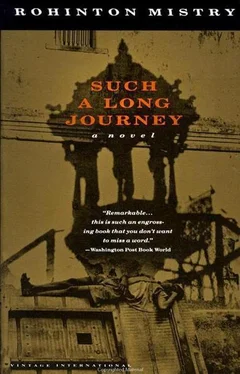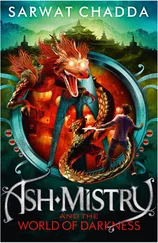‘But it’s true. She sends men from RAW to spy on opposition parties, create trouble, start violence so the police can interfere. It’s a well-known fact.’
‘I read the papers and I know what goes on. Rumours and allegations all the time, and no proof!’ Like a malarial fever his irritation started to rise.
‘What about the chemical election? Only RAW could have done that. She made a real mockery of democracy.’
He snatched the letter from Sohrab’s hand. ‘Another rumour! What do you think, the election was a children’s magic show? All this nonsense about chemically treated ballots, and crosses appearing and disappearing automatically! Mockery of democracy is that people are willing to believe rumours. Without proper evidence.’
‘Lots of evidence was presented in court. Enough for the judges to send the case to trial. Why do you think she transferred them?’ Sohrab appealed to his mother in frustration.
She listened helplessly as Gustad said that the blood in his brain was boiling again. Now the boy was pretending to be an expert on law and politics and RAW. The enemy was at the border, that Pakistani drunkard Yahya was cooking something in partnership with China, and fools like her son went around saying rubbish about the Prime Minister. He lifted a finger and pointed. ‘Better that the genius shuts his mouth before I shut it for him. Before he falls off that high roof he has climbed.’
Sohrab rose in disgust to leave the room. ‘Wait,’ said Gustad, and asked Dilnavaz, ‘Where are those application forms?’
She handed him the lot, grieving. How silly to have hope in green limes. Unless. Unless, as Miss Kutpitia said, something stronger is needed. If the evil, the darkness, is more powerful than she estimated.
Gustad gave the forms to Sohrab, and told him to count the number of places he had been to for a worthless, ungrateful boy, the number of times he touched his forehead and folded his hands, and said ‘sir’ and ‘madam’ and ‘please’ and ‘thank you very much’. ‘Count the forms,’ he said, ‘then throw them away.’
‘OK.’ Sohrab took the forms and riffled them while walking down the narrow passage to the kitchen.
‘Shameless dog.’ Gritting his teeth, Gustad heard the rustle and soft slap of paper against the rusted rubbish-pail. Dilnavaz hurried to rescue the forms from the gloppy stuff at the bottom. She hid them in the arched recess, under the choolavati, where coal was stored in the old days before kerosene and gas. The green limes were also collecting there, waiting for a sea burial.
On Monday, after another torturous night of mosquitoes, Gustad left early for work. Morning was the best time to see the manager, who, according to the staff, was a very stiffly-starched fellow, and not merely because of the hard, unyielding collars he wore regardless of heat or humidity. But Mr. Madon could stay cold and aloof, thought Gustad, and tie silly bows round his rigid neck, so long as he was impartial in matters regarding the bank. And if he wanted to keep his first name a secret, that, too, was Mr. Madon’s own pompous business.
Twenty-four years ago, when Gustad had just joined the bank, Mr. Madon was an assistant manager. It was rumoured that the then manager had found Mr. Madon’s snuff habit quite abhorrent, and ordered him to stop, despite the fact that it was a twenty-two karat gold snuffbox into which Mr. Madon dipped with the utmost style. One thing quickly led to another, and though no one knew exactly what happened, it was the manager who departed under a dark cloud. Mr. Madon immediately ascended the coveted chair.
An old peon who now spent his time in an unhectic corner on a stool as rickety as his person, doing nothing more strenuous than drinking glasses of tea or fetching them for others, claimed to have once overheard the secret first name. The peon, Bhimsen, who never used his own surname (it was not certain if he even had one) would tell of the time when he had barged in accidentally while Mr. Madon and the manager were locked in a pungent quarrel. Accidentally, for one of the two had slammed a ledger on the desk, triggering the bell that was Bhimsen’s summons. But the moment of eavesdropping had occurred so many years ago that though Bhimsen remembered the event, he had forgotten the name.
Mr. Madon’s heart, however, was as kind as his habits were finicky. He was absurdly particular about the arrangement of things on his desk: the calendar, pen stand, paperweight, lamp, all had to be positioned just so. When old Bhimsen was low on funds, he would come to work early, unshaven, and displace things while dusting Mr. Madon’s office. Then the manager would arrive, notice the misalignment, and ring for Bhimsen. Invariably, the perfunctory scolding was followed by a gift of fifty paise for a shave at the downstairs barber, which Bhimsen pocketed before proceeding to the bathroom where his razor was hidden.
‘Half-day off?’ said Mr. Madon to Gustad. ‘This Friday?’ He leaned forward and looked at the desk calendar through goldrimmed glasses. ‘Hmmm.’ He raised his eyes over the gold rims and tapped the snuffbox. ‘Why?’ The snappiness might have seemed rude to someone not familiar with his mannerisms.
Gustad tore his thoughts away from the rich, warm lustre of Mr. Madon’s leather chair. He had envied the occupant while admiring the chair for twenty-four years, and for the first few, had even harboured an ambition to make it his own some day. Very soon, though, he realized there was no room for him in that seat, given the nepotic scheme of things everywhere and the ragged path his own life had taken. He had prepared his story for Mr. Madon. ‘Have to go to doctor. This leg, giving trouble again.’
Last night in bed, while trying out the various offerable excuses for shape, size and credibility, his first plan was to say that his little girl had to be taken to the doctor. But he quickly abandoned that pretext in mid-creation. Fear of the Almighty’s wrath, or something like it, caused him to steer away from making imaginary illnesses befall his children. There was a heavenly host of angels, his grandmother had taught him long ago, who, from time to time, listened to the words and thoughts of mortals, and granted whatever was desired therein. Of course, this did not happen very often, she explained, because it was only a minor host, which was a blessing, considering how carelessly and unthinkingly most people used words. All the same, it was of the utmost necessity to keep one’s thoughts good, lest, at the moment of a bad thought, an angel might listen and make it come to pass.
‘What happened to your leg?’ asked Mr. Madon. The snuffbox was open now.
‘Nothing new, sir, just my accident from nine years ago.’ Rather me than my children. ‘It is causing—’
‘I remember your accident. You were on leave for fourteen weeks.’ He looked at the calendar again. ‘What time?’
‘One o’clock, please.’ Each time Mr. Madon leaned forward, the collar cut deeply into his neck. How did he suffer that day after day? Starch was one thing, plywood another.
‘And you will come back to the office after your appointment?’ The snuffbox moved closer. His index finger and thumb, pinched together, hovered like an insect over the dark brown powder.
‘Yes, sir, if it is before six o’clock, definitely, sir.’
‘Fine,’ snapped Mr. Madon, and was echoed by the calendar snapping shut. The audience was over. Then, quicker than Gustad’s eye could follow, a trace of snuff was lifted to the right nostril.
‘Thank you very much, sir,’ he said, and limped to the door. As he shut it behind him, the Officers’ Enclave resounded with a series of explosive sneezes. He walked down the corridor, remembering to limp pronouncedly.
Читать дальше












